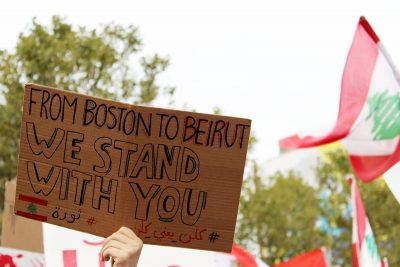
More than 200 Boston residents rallied in Copley Square on Sunday, waving Lebanese flags and standing together to protest and raise awareness around governmental corruption in Lebanon.
Clad in the Lebanese national colors of red, green and white, the demonstrators gathered in front of the Boston Public Library in a show of solidarity with fellow protesters in Lebanon who are currently rallying for political and economic reform.
The Boston activists toted posters questioning the Lebanese government’s actions, chanted patriotic Lebanese phrases and songs, and danced a traditional Lebanese dance called the “dabke.”
Since Oct.17, protesters have flooded the streets of Lebanon, accusing the government of widespread corruption and severe economic mismanagement, according to BBC. The protests were triggered by a fiscal plan that sought to tax calls made on the popular messaging platform WhatsApp—among other fees—but soon morphed into a wider protest calling for systemic reform and even revolution.
As of Sunday, Lebanon has seen four straight days of protests, according to the BBC.
The Boston rally began at 4 p.m., with Lebanese residents and their supporters gathering for for over two hours. During the first hour, demonstrators waved flags and chanted in support of reform, while the second hour was primarily spent connecting with others within Boston’s Lebanese community.
The demonstration in Boston was organized by a group called the Lebanese Youth Leadership in Boston, and was one of many local protests organized by Lebanese activists in cities across the world, in an effort to show their support for friends and family currently living in Lebanon.
Gerard Merhi, a 19-year-old Northeastern University student, said he helped organize the event by creating the WhatsApp group chat in which much of the event was organized.
“Me and my friend made a WhatsApp group and we [each] added 15 people each so it could be 30,” Merhi said. “And then those 30 people each added 10 people that they knew, and it kept getting bigger and bigger.”
Merhi said the group chat ultimately accumulated around 300 members and said the members discussed how to plan the event.
“In the chat we gave our opinions on the different ways to design the posters, who can get flags, and who would bring the speakers,” Merhi said.
However, Merhi said the group chat was also used to share news about the escalating situation in Lebanon.
“We also sent each other pictures of what was going on in Lebanon at the point, cause during the protests all the main news networks weren’t covering anything,” Merhi said. “So essentially, media for us, in the revolution, right now is still based on Instagram and Snapchat.”
Protester and Watertown resident Anis Ali Hassan, 63, said he wants the people of Lebanon to know that they have Boston’s support.
“We support them one hundred percent and we are against this corrupt government and corrupt political regime that we have in Lebanon,” Ali Hassan said.
Ali Hassan said he is the most worried by the Lebanese government’s seeming inability to protect its people as the country descends into a massive economic and debt crisis.
“The poverty is spreading all over the country, people are in distress, no jobs, no basic lively things, all the people are deprived, they pay taxes, and they get nothing in return,” Ali Hassan said.
Hala Abirustom, 23, of Westwood, said that the economic crisis is so severe that education does not guarantee employment in Lebanon.
“I can’t go back home because nobody can find a job, even the people who have masters, PhDs, like nobody has a job,” Abirustom said.
Abirustom said she urged supporters around the world to post as much as possible about what is going on in Lebanon on social media.
“They’re cutting out the internet. In Lebanon, you put on the news, we’re not on TV,” Abirustom said. “They’re trying to hide this from the world.”
George Matta, 23, of Plainville, said he hopes the people of Lebanon can experience the same prosperity as their counterparts in America.
“We’re here for change, a positive one, we are standing today so that our country can have the same opportunities we came here for,” Matta said.
Merhi said that fellow students and residents could show their support for the protesters in Lebanon by reaching out to their local representatives.
“The situation in Lebanon right now is economically dire and I feel like one way we can garner local support is by you guys contacting your representatives in order to encourage Congress to pass a motion,” Merhi said, “or tell your representatives to talk to the UN or just raise awareness about the issue.”





Awesome article! Thanks Mia 🙂
Great article! Do you know of further protests happening in Boston? I’m in town from Lebanon this week and would love to join.